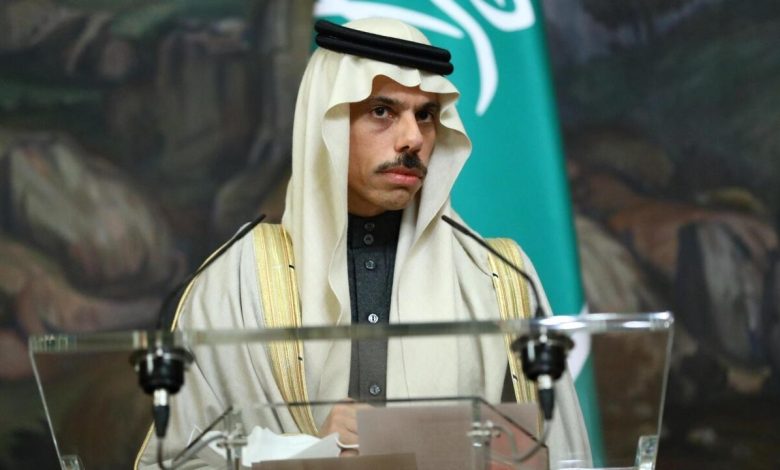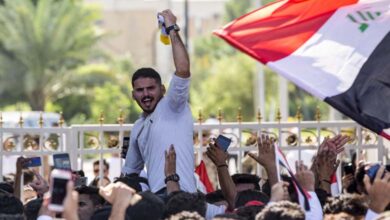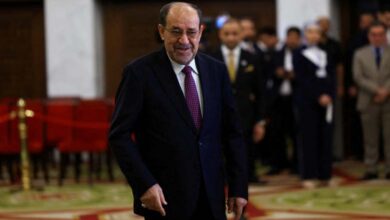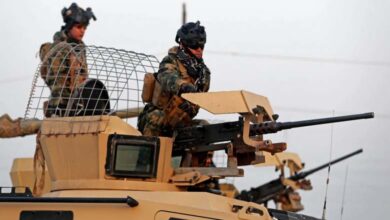Saudi Arabia wants a permanent ceasefire as a basis for Yemeni-Yemeni dialogue

Saudi Foreign Minister Prince Faisal bin Farhan said on Thursday in Moscow that his country wants to reach a settlement that ends the crisis in Yemen and guarantees security and stability through a permanent ceasefire.
He confirmed that there are ongoing efforts through the United Nations to launch a political process between the Yemeni parties, but did not provide further details. His statements come two days after a meeting between Saudi Crown Prince Mohammed bin Salman, Chairman of the Presidential Command Council Rashad Al-Alimi, and members of the Council.
In a Tuesday meeting with al-Alimi, Prince Mohammed reiterated the kingdom’s support for Yemen’s security and stability, as well as its support for efforts to reach a comprehensive political solution under the auspices of the UN.
In a press conference with his Russian counterpart Sergei Lavrov in Moscow, the Saudi foreign minister said the priority is “a ceasefire, then dialog”, in a statement highlighting an initiative to pave the way for ending the conflict.
Saudi Arabia is co-ordinating with international partners, including Russia, he said, praising Russia’s role in supporting the outputs and foundations of international legitimacy in Yemen’s affairs.
In a goodwill gesture from the Saudi-led Arab coalition, and in an effort to advance UN efforts to revive Yemen’s peace talks, a container ship loaded with general commercial goods docked in the Houthi-controlled port of Hodeida last week for the first time since 2016.
This came a week after ships entered the port without being detained or delayed, a move the Houthis saw as an indication of “enhancing the chances of peace.”
An official with Yemen’s internationally recognized government said allowing commercial ships through was a confidence-building measure aimed at supporting talks between Saudi Arabia and the Houthis to reactivate the truce that expired in October.
In January, Oman led mediation efforts in an attempt to break the deadlock in the peace talks, but the Houthi rebels have set more conditions for returning to the negotiating table, although they described the talks with the Omani delegation as positive.
In February, the momentum for diplomatic action was evident as Washington sent its envoy to Yemen, Tim Linderking, to the region following a visit by UN envoy Hans Grundberg to the capital, Sana’a (in January), shortly after the Omani mediation delegation left the rebel-held capital of Yemen in 2014, as it explores the chances of renewing a two-month truce.
The UN, as well as international and regional actors, are making efforts to extend a six-month truce in Yemen that ended on 2 October last year, with the government and the Houthis accusing each other of failing to extend it.
In the months since the truce ended, the Houthis have stepped up attacks on oil ports in the south of the country. They have also launched attacks on the Yemeni army in a number of provinces, such as oil-rich Marib, which is close to the Saudi border.
They also threatened to target oil tankers in the Red Sea with anti-ship missiles or boat bombs in the service of Iranian interests after sanctions were tightened on Tehran for removing its nuclear obligations, suppressing internal protests and handing over to Russia marching planes used in the Ukrainian war.
In February, the French navy intercepted an Iranian ship carrying 3,000 rifles, half a million rounds of ammunition and 20 guided missiles destined for the Houthi militia.
Earlier this month, the British Royal Navy announced it had seized Iranian arms from a smuggling boat in the Gulf of Oman last month, including anti-tank guided missiles on its way to Yemen.
It was not the first time that international powers foiled an attempt to smuggle arms from Iran to the Houthi rebels, as part of Tehran’s scheme to destabilize the region’s security and inflame the situation, thus thwarting any attempts to bring peace to the war-torn country.












